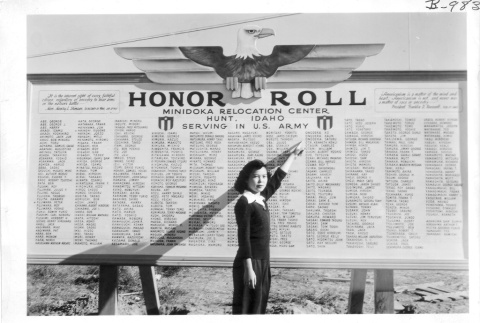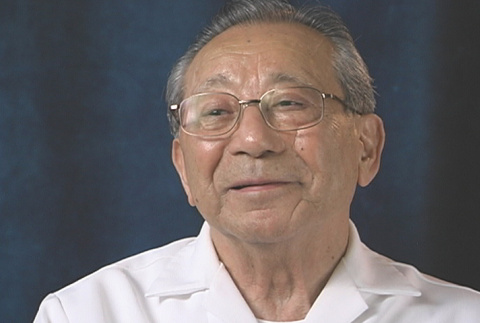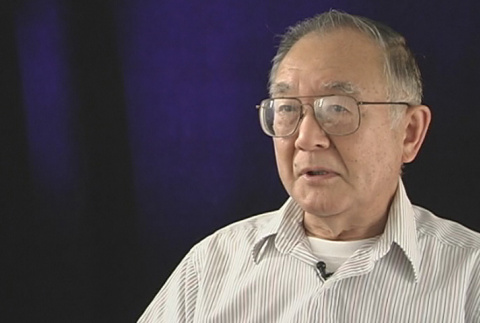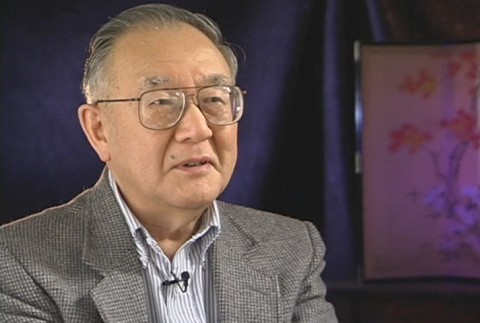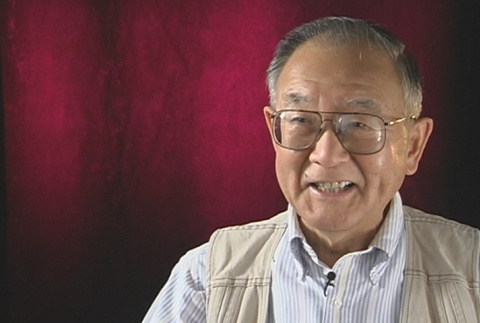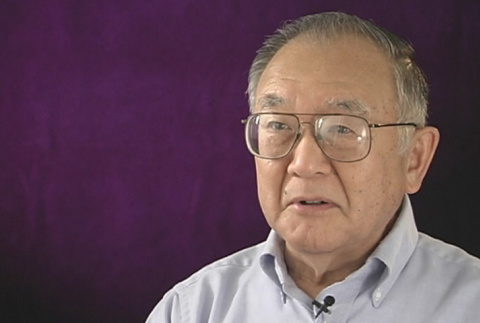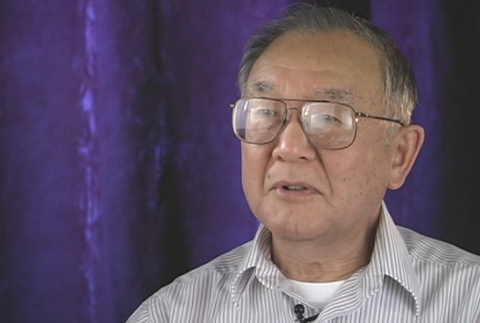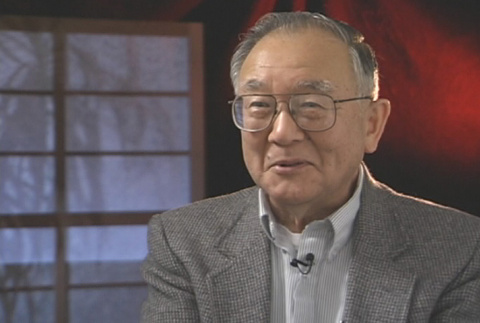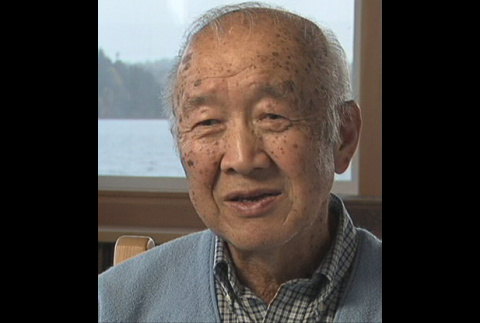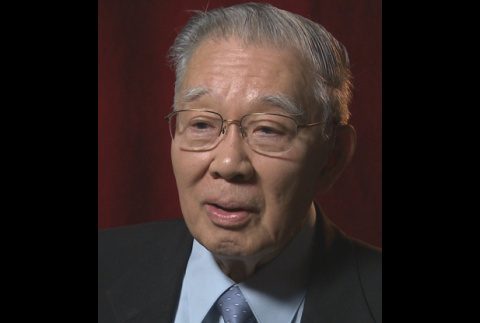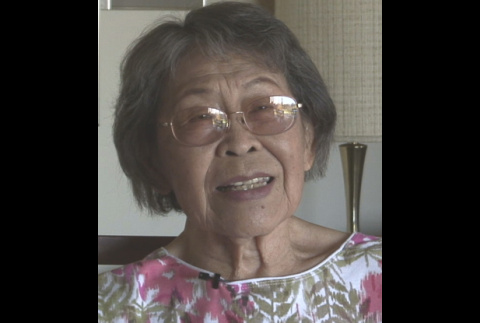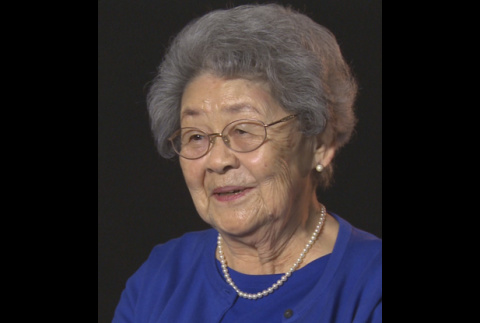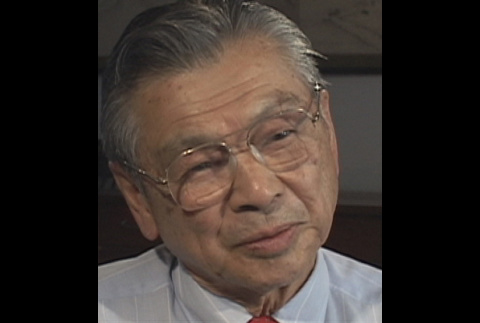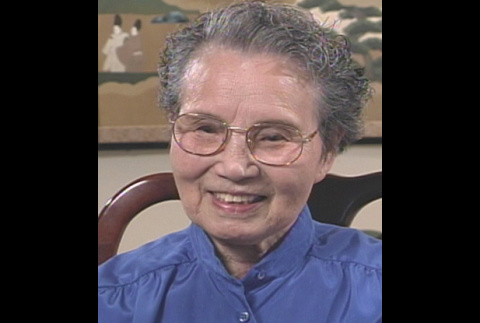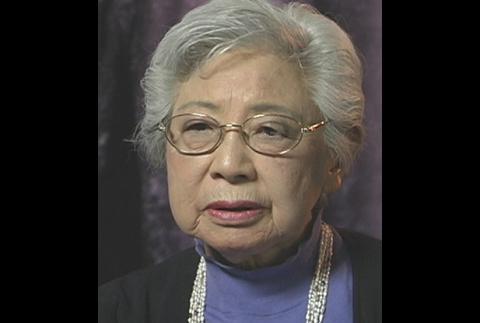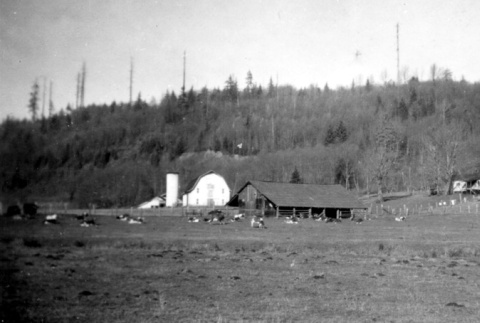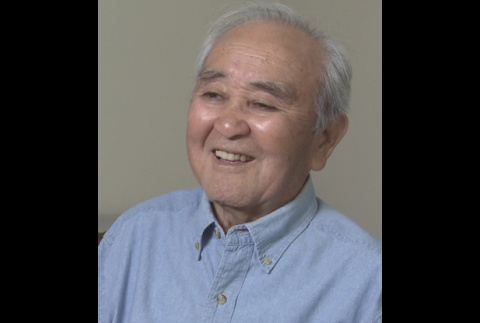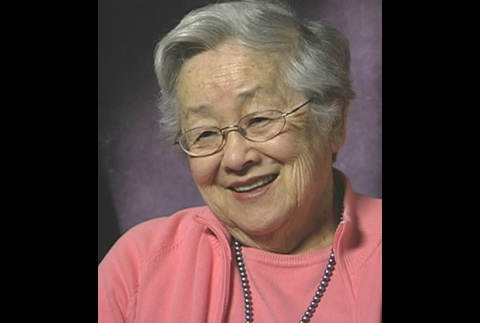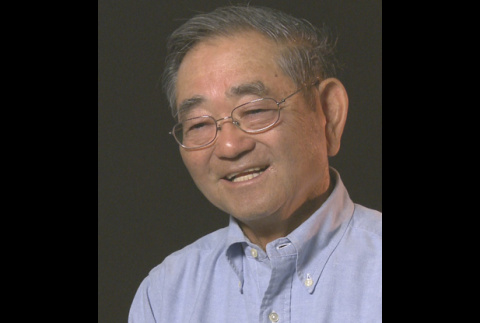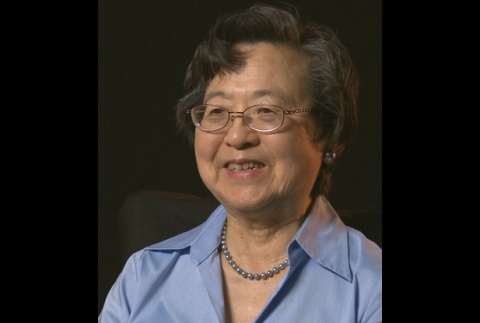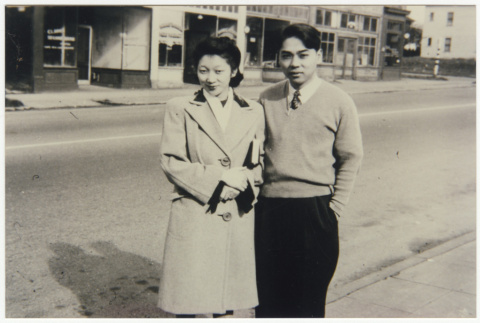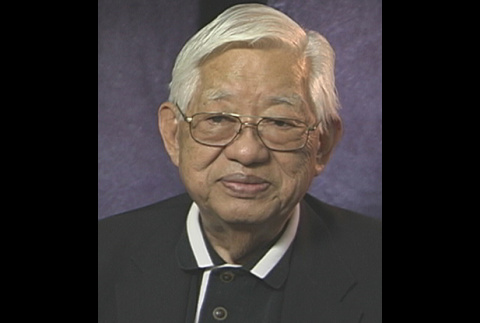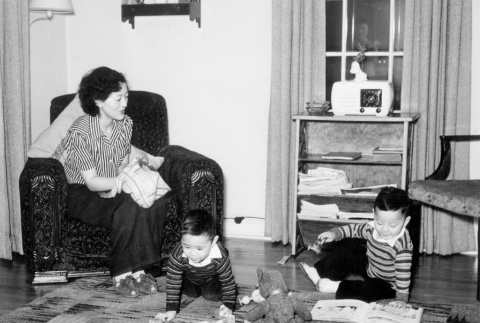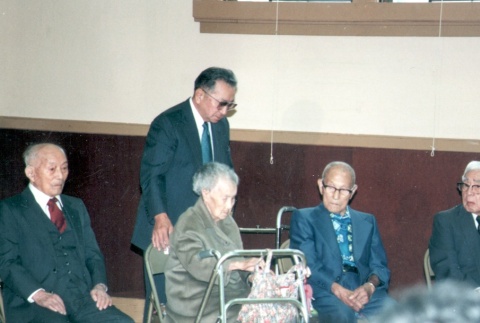10000 items
10000 items

av
An Oral History with Seiko Ishida (ddr-csujad-29-11)
Retired Kibei teacher recounts samurai parents' background and their immigration to Seattle, Washington; socioeconomic composition of Seattle's Japanese community; earlier teacher training; prewar stays in Japan as a child and as a tutor in a missionary family; experiences as a teacher in the wartime resettlement in New York; and postwar return to Los Angeles. This oral …
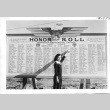
img
Japanese American pointing at Honor Roll sign (ddr-densho-37-748)
Original WRA caption: Fumi Onodera, 20, proudly points at the names of her 3 brothers, Kid, 26; Kaun, 24; and Satoru, 22, on the Honor Roll of Japanese-Americans serving in the U. S. Army from the Minidoka Relocation Center, Hunt, Idaho. The 3 brothers are training in a combat team at Camp Shelby, Mississippi with other …
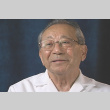
vh
Minoru "Min" Tsubota Interview (ddr-densho-1000-149)
Nisei male. Born December 1, 1918, in Kent, Washington. Became interested in music in junior high school, and played in various music groups. Upon graduating from high school, worked for a manufacturing plant, and then volunteered for the army. Separated from unit along with other Japanese Americans after the bombing of Pearl Harbor, and eventually served …
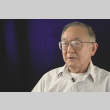
vh
Henry Miyatake Interview IV (ddr-densho-1000-56)
Nisei male. Born April 28, 1929, in Seattle, Washington. Incarcerated at Puyallup Assembly Center and Minidoka concentration camp, Idaho. Had some key childhood experiences with discrimination that made him a self-described, "independent thinker," and later, an influential figure in the Japanese American community. While a teenager in camp, he wrote and defended an essay criticizing the …
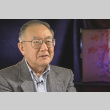
vh
Henry Miyatake Interview I (ddr-densho-1000-53)
Nisei male. Born April 28, 1929, in Seattle, Washington. Incarcerated at Puyallup Assembly Center and Minidoka concentration camp, Idaho. Had some key childhood experiences with discrimination that made him a self-described, "independent thinker," and later, an influential figure in the Japanese American community. While a teenager in camp, he wrote and defended an essay criticizing the …
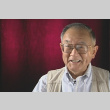
vh
Henry Miyatake Interview V (ddr-densho-1000-57)
Nisei male. Born April 28, 1929, in Seattle, Washington. Incarcerated at Puyallup Assembly Center and Minidoka concentration camp, Idaho. Had some key childhood experiences with discrimination that made him a self-described, "independent thinker," and later, an influential figure in the Japanese American community. While a teenager in camp, he wrote and defended an essay criticizing the …
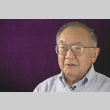
vh
Henry Miyatake Interview III (ddr-densho-1000-55)
Nisei male. Born April 28, 1929, in Seattle, Washington. Incarcerated at Puyallup Assembly Center and Minidoka concentration camp, Idaho. Had some key childhood experiences with discrimination that made him a self-described, "independent thinker," and later, an influential figure in the Japanese American community. While a teenager in camp, he wrote and defended an essay criticizing the …
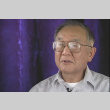
vh
Henry Miyatake Interview VI (ddr-densho-1000-58)
Nisei male. Born April 28, 1929, in Seattle, Washington. Incarcerated at Puyallup Assembly Center and Minidoka concentration camp, Idaho. Had some key childhood experiences with discrimination that made him a self-described, "independent thinker," and later, an influential figure in the Japanese American community. While a teenager in camp, he wrote and defended an essay criticizing the …
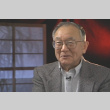
vh
Henry Miyatake Interview II (ddr-densho-1000-54)
Nisei male. Born April 28, 1929, in Seattle, Washington. Incarcerated at Puyallup Assembly Center and Minidoka concentration camp, Idaho. Had some key childhood experiences with discrimination that made him a self-described, "independent thinker," and later, an influential figure in the Japanese American community. While a teenager in camp, he wrote and defended an essay criticizing the …

Narrator Zen Shibayama
Nisei male. Born July 5, 1924, in Seattle, Washington, but raised in Bainbridge Island, Washington. Lived in Japan for several years, returning to the U.S. just prior to the bombing of Pearl Harbor in 1941. Moved with family to Moses Lake, Washington, as part of "voluntary evacuation." Drafted into the army and served with the Military …

Narrator Eugene Tatsuru Kimura
Nisei male. Born September 19, 1922, in Sheridan, Wyoming. At a young age, moved to Seattle, Washington, and spent most of childhood there. Was enrolled at the University of Washington when Japan bombed Pearl Harbor on December 7, 1941. Removed to the Puyallup Assembly Center, Washington, before returning with family to Sheridan. Attended the University of …

Narrator Masako Yoshida
Nisei female. Born July 14, 1924, in Seattle, Washington. Spent early years in Seattle before family moved to the Boyle Heights neighborhood of Los Angeles, California, where father worked as a janitor at a wholesale produce market. After the bombing of Pearl Harbor, removed to the Poston concentration camp, Arizona. Left camp to work in Detroit, …

Narrator Misa Taketa
Nisei female. Born January 18, 1925, in Seattle, Washington. Grew up in the South Park area, south of Seattle, where parents ran a farm. During World War II, removed to the Pinedale Assembly Center, California, and the Tule Lake concentration camp, California. After leaving camp, lived and worked in Ontario, Oregon, for a time, before living …

Narrator Toshio Inahara
Nisei male. Born January 9, 1921, in Seattle, Washington. Grew up in Tacoma, Washington, where father ran a Japanese confectionery. In the early 1930s, moved with family to Oregon. During World War II, family took advantage of the "voluntary evacuation" period and moved to Ontario, Oregon. Attended medical school and established a prominent career as a …

Narrator Marian Asao Kurosu
Issei female. Born March 10, 1907, in Fukui prefecture, Japan. Graduated from Jinai Girls School. After grandfather's death, came to Seattle, Washington in 1924 to join father and uncle, working in family-run agricultural greenhouse. Arranged marriage to Mr. Roy Naoe Kurosu, an Issei working in Tacoma sawmills. Started new greenhouse in Sunnydale, Washington until all people …

Narrator Betty Fumiye Ito
Nisei female. Born March 29, 1918, in Seattle, Washington, and spent childhood in Medina and Bellevue, Washington. While in high school was a member of the Bellevue Strawberry Festival's Queen's Court. In 1939 married Kenji Ito, a prominent Japanese American lawyer who practiced in Seattle. Following the bombing of Pearl Harbor, recounts her experiences as her …
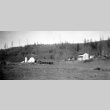
img
Dairy farm (ddr-densho-46-2)
Kamezo and Miye Nakashima were from Saga-ken, Japan. They settled in Days, Washington in the early 1900s. Their 1,300-acre farm was largely self-sustaining and the Nakashimas purchased only dry goods. Produce such as corn, potatoes, lettuce, and fruit were grown on the farm. The property line of the farm extended far beyond the tree line shown …

Narrator Giro Nakagawa
Nisei male. Born March 13, 1921, in Seattle, Washington. Grew up in Kent, Washington, where parents ran a farm. In the 1930s, moved to South Bend, Washington, to work for the New Washington Oyster Company. During World War II, removed to the Pinedale Assembly Center, California, and soon left to work on farms in Utah for …

Narrator Kajiko Hashisaki
Nisei female. Born March 27, 1924, and raised in Seattle, Washington. After the bombing of Pearl Harbor, was removed to the Puyallup Assembly Center, Washington, and the Minidoka concentration camp, Idaho. Left Minidoka in 1943 to attend school in St. Paul, Minnesota. Married in 1945, and lived in Japan for sixteen months before returning to the …

Narrator Ted Kitayama
Nisei male. Born July 27, 1929, on Bainbridge Island, Washington. Grew up on Bainbridge where parents ran a nursery business. During World War II, removed to the Manzanar concentration camp, California. Transferred to the Minidoka concentration camp, Idaho, along with many other Japanese Americans from Bainbridge Island. After leaving camp, moved to Seattle, Washington, eventually establish …

Narrator Margaret Junko Morita Hiratsuka
Nisei female. Born July 22, 1928, in Seattle, Washington. Father ran a prominent hotel which was frequently patronized by visiting Japanese dignitaries. Father was picked up by the FBI on December 7, 1941. During the war, removed with family to the Puyallup Assembly Center, Washington, and the Minidoka concentration camp, Idaho. After leaving camp, moved to …
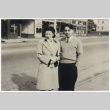
Collection
Tokuda Family Collection (ddr-densho-383)
The Tokuda Collection consists of three accessions. Accession 1 of the Tokuda collection contains a photograph album of George Tokuda's from his time as a student at the University of Washington in Seattle. Other subjects in the album include summers working in Alaska, and friends and family growing up in Mukilteo. This collection also includes other …

Narrator Ed Tsutakawa
Nisei male. Born May 15, 1921, in Seattle, Washington. Spent much of childhood in Japan, returning to the U.S. at the age of fifteen. Began attending the University of Washington before being removed to Puyallup Assembly Center, Washington, and Minidoka concentration camp, Idaho. Created a series of art pieces depicting camp life. Moved to Spokane, Washington, …
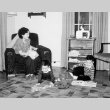
img
WRA resettlement image (ddr-densho-7-7)
Original WRA caption: Here is a corner view of the spacious living room in the home of the Kaneko and the Isoda families who have resettled in Milwaukee. Mrs. Tei Kaneko is opening her knitting bag while on the floor (left to right) are Robin Isoda, 2-1/2 -year-old son of Mr. and Mrs. Georg[e] Isoda, and …
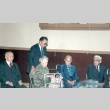
img
Issei waiting to receive their redress checks (ddr-densho-10-11)
Four Issei, all at least 100 years of age, waiting to receive their redress checks at the Nisei Veterans Hall in Seattle, Washington. Left to right: Mr. Katsuo, Ms. Wakamatsu, Mr. Ishimitsu, and Mr. Nakagawa. The fifth Issei recipient, Mr. Frank Yatsu, is not pictured. The man standing behind Ms. Wakamatsu is unidentified. The Civil Liberties …

